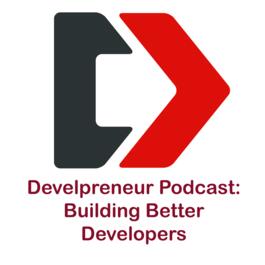
Personal Branding and Resumes: Building Your Professional Story
In Season 23, Episode 11 of the Building Better Developers podcast, Rob Broadhead and Michael Meloche dive into a critical career-building topic: personal branding and resumes. This episode focuses on cultivating habits that help you stand out professionally, ensuring your unique skills and experiences consistently shine through. The Importance of Personal Branding Rob and Michael emphasize that personal branding is more than just having a polished resume or LinkedIn profile—it’s about telling your professional story in a way that resonates with your audience. Your brand reflects who you are, what you do, and the value you bring. Whether you’re job hunting, building a consulting business, or expanding your professional network, your personal brand is what makes you memorable. A key takeaway is the idea of keeping your personal brand “evergreen.” Both hosts suggest that updating your resume or professional portfolio should not be an emergency task you tackle only when job opportunities arise. Instead, integrate regular updates into your routine. Reflect on your accomplishments, skills, and contributions weekly or monthly. This habit ensures that your professional narrative remains current and impactful. Keeping Your Resume Relevant Rob highlights a challenge many professionals face: remembering and articulating the achievements of the past year—or longer—when it’s time to update their resume. By maintaining a habit of documenting accomplishments in real-time, you create a detailed record that can be mined for updates later. He suggests taking a few minutes each week to jot down what you worked on, the challenges you overcame, and the results you achieved. This simple practice ensures that your resume is always ready for the next opportunity. The podcast also touches on tailoring resumes for specific opportunities. Instead of submitting a one-size-fits-all document, emphasize the skills and experiences most relevant to the role. For instance, if applying for a management role, highlight leadership and strategic accomplishments. For a technical position, focus on specific tools, programming languages, or technical challenges you’ve mastered. Leveraging Blogs and Online Portfolios Michael introduces the idea of using blogs and personal websites as an extension of your resume. Blogs allow you to showcase thought leadership, detail significant projects, and demonstrate your problem-solving process. If a recruiter or potential client stumbles upon your blog, they gain a richer understanding of your capabilities than they would from a traditional resume. To make your blog more effective, tag and organize your posts by skill or industry focus. This structure makes it easier for potential employers to find content relevant to their needs. While LinkedIn remains a powerful platform for professional networking, having your own space gives you greater control over how your personal brand is presented. Adapting to Early and Late-Career Challenges The podcast also addresses challenges that professionals face at different stages of their careers. Early-career individuals often struggle to fill their resumes with meaningful content. Michael advises focusing on academic projects, internships, and volunteer work. Highlighting the tangible results of your efforts in these areas can make your limited experience feel more substantial. For seasoned professionals, the challenge lies in condensing decades of experience into a digestible format. Michael recommends creating a “master document” that includes all your career achievements. From this comprehensive list, you can cherry-pick the most relevant details for each application. He also mentions that cover letters are making a comeback as a way to showcase your enthusiasm and fit for a specific role. Building a Virtual Resume for Stronger Personal Branding Rob and Michael advocate for creating an online “resume” or portfolio that potential employers or clients can explore. This digital space could include blog posts, project summaries, and testimonials. Unlike a static paper resume, an online portfolio is dynamic, offering richer context and demonstrating your continuous growth. The Power of Consistency in Personal Branding Throughout the episode, the hosts stress the value of consistent effort. Building and maintaining your personal brand is a long-term investment that requires ongoing attention. By dedicating time to updating your resume, documenting accomplishments, and sharing insights through blogs, you ensure that your professional image is always ready to impress. Challenge: Start Small, Build Momentum To close the episode, Rob presents a challenge: spend five minutes a day for the next week documenting what you accomplished. At the end of the week, summarize your key achievements in one paragraph. This exercise not only helps you build a habit but also lays the foundation for a more robust and authentic personal brand. Stay Connected: Join the Develpreneur Community We invite you to join our community and share your coding journey with us. Whether you’re a seasoned developer or just starting, there’s always room to learn and grow together. Contact us at info@develpreneur.com with your questions, feedback, or suggestions for future episodes. Together, let’s continue exploring the exciting world of software development. Additional Resources Listing Education On Your Resume and Personal Branding Your Personal Portfolio – Work and References On Your Branding Site Your Personal Branding Website – Advertise Yourself On The Web Protecting Your Brand and Avoiding Legal Trouble Building Better Habits Videos – With Bonus Content
From "Develpreneur: Become a Better Developer and Entrepreneur"


Comments
Add comment Feedback